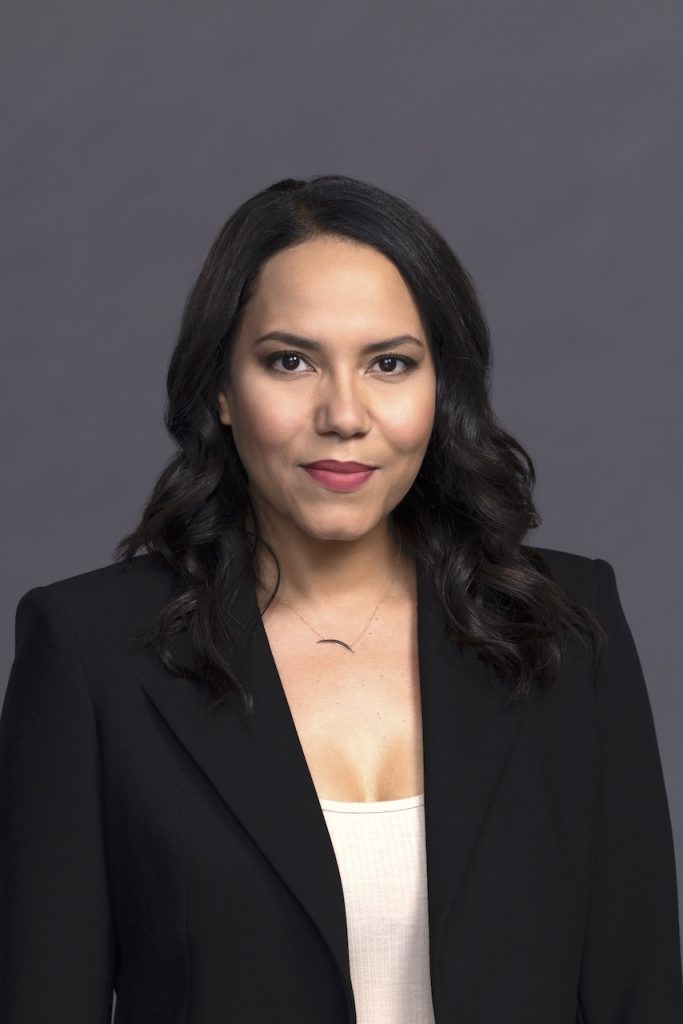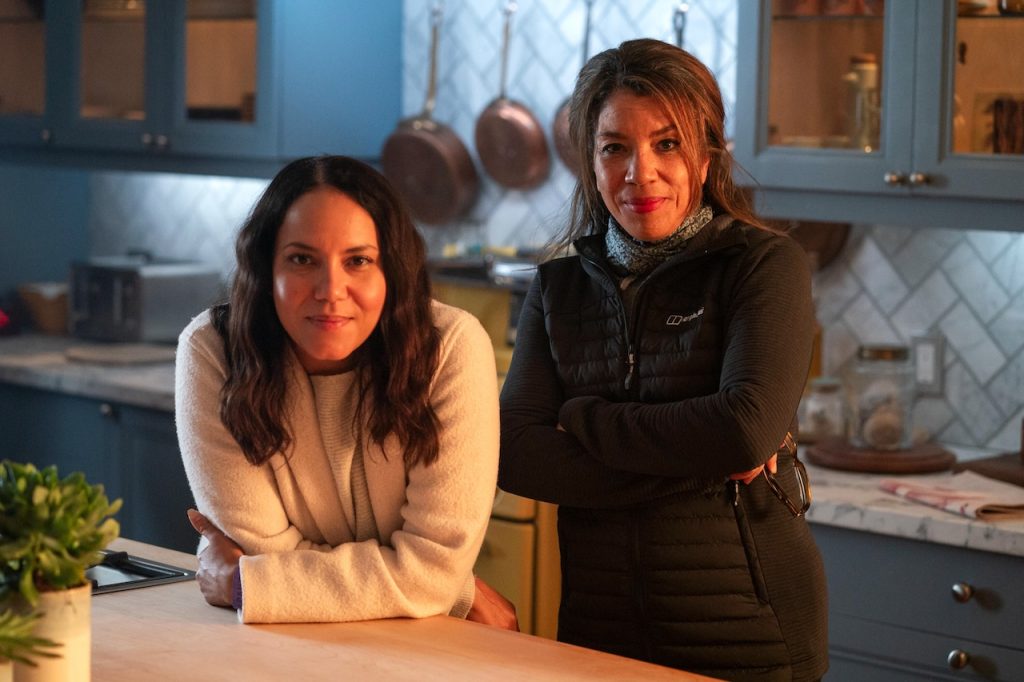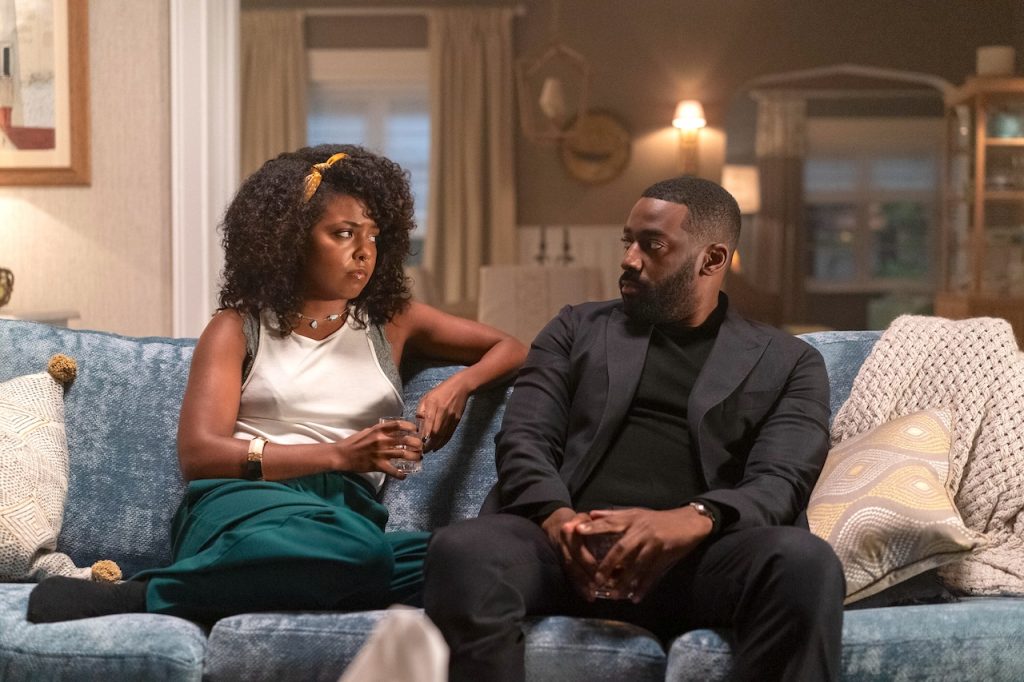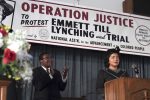“Identity, Shame & Secrets” Marissa Jo Cerar Serves “Black Cake”

Merriam-Webster defines intersectionality as “The complex, cumulative way in which the effects of multiple forms of discrimination (such as racism, sexism, and classism) combine, overlap, or intersect, especially in the experiences of marginalized individuals or groups.”
Marissa Jo Cerar is known for her intersectional storytelling and female-fronted narratives on projects such as The Fosters and Women of the Movement. So when she was presented with the opportunity of adapting Charmaine Wilkerson’s book Black Cake, she knew she was perfectly suited to the job.
Black Cake centers around Covey (Mia Isaac), and her tumultuous journey from Jamaica to England to America. Part mystery, part family drama, the series spans several decades and much of the story is relayed via recordings left by a dying woman to her children. Marissa Jo’s lived experience gave her unique insight into several of the characters and she speaks passionately about bringing them to life.
How did you become involved with this project and what was your familiarity with Charmaine Wilkerson’s novel?
I was sent the manuscript about three years ago and I just fell in love with it. I love the characters and the world. I love the fact that the lead is this young mixed race girl/ woman who’s literally running for her life. I love the stakes, which are so high. And the subject matter covers things that felt new and nuanced. I just wanted to be part of it. Honestly, I thought, “Nobody else can do it, it has to be me.”

Marissa Jo Cerar. Photo by Matt Sayles/ Hulu
I asked to meet Charmaine via Zoom to tell her how much I loved it and how much I would protect it. I really wanted to bring it to life and make sure that some of the quiet aspects of the book and the really character-driven things were not lost in a splashier TV or movie adaptation. I felt strongly that this should be a TV series because there’s so much depth, so many layers, and I wanted to really honor all of the characters that she created.
Initially, I wasn’t familiar with the book at all, it was sent to me by my agent. He knows me well and knows that this is the type of material I respond to. He also knows my personal story and being mixed race and growing up where I did, I think he knew how much I’d relate to Covey specifically. And I did. I saw my teenage self in her.
Were there elements of the story you needed to change in the course of adaptation?
Not really! I might have if I had been limited by production. I think other productions could have said, “You’re not shooting in Jamaica…or Italy… or England… or California.” But none of that was said to me at any point.
I had just finished my first project as showrunner with Kapital Productions and Michael Lohmann, the head of production. We had worked very closely on Women of the Movement and overcame a lot of obstacles there. He understood how much I care and how much of myself I put into my work and we wanted to be authentic. We knew it would be challenging to shoot in Jamaica, but we just had to. It was important and it’s where the book is set. It was also very important to have Jamaican people as part of the show. We continually found creative ways to make it work, so there really were no limitations.
Anything I changed was either to condense, combine or expand on the story. All of episode 3 was based on one page in the book, but we expanded it and added in some other characters. We were filming that scene when Charmaine was on set, and she turned to me and said, “It’s so amazing to see this… I created the world, but not this character or any of this dialogue. It’s just so exciting.” That little anecdote is so representative of what it was like to work and collaborate with Charmaine. She sees the series as its own thing. The book will always be the book, and no one can ever say that it doesn’t exist.
I only changed something if I really felt like it was necessary, and any changes I made were rooted in the truth of the text. The intentions remain the same. But nothing had to be changed because of production limitations.
It is a big, layered story. Did eight episodes feel like the right fit to capture everything you needed to?
I pitched eight episodes when I took on the project because I had to map it out so specifically. I really wanted to make it clear that I was ready to go. “As soon as we sell this, let’s get it done.” Eight episodes felt right for season one, but there’s still way more story to tell. The way we structured season one, it would be impossible to tell all of certain characters’ stories. So I’m excited to do that in season two. There are many more mysteries to solve. But eight episodes felt right for this first big story.
How much did your lived experience inform this project?
One of the main reasons I was attracted to this was because of my experience and similarity to some of the characters. I talked to my writers’ room about that. I wanted to impart it into the show; some of my experiences of trying to figure out where I belonged and who I was. How I identify and all of those things – they are very much Covey’s story as well. When you actually start talking about things and get sent back in time, that can be hard. But that’s why I am a writer – because of my experiences, because of my empathy and because of my unique upbringing with my very unique family. I bring all of that to the table. Using my experience, I was able to be authentic in my approach to the characters.

Marissa Jo Cerar & Charmaine Wilkerson. Photo by James Van Evers/ Hulu
Identity is a very prominent theme in the series. What are some other themes you explore?
The power of female friendships and female relationships. Bunny (Lashay Anderson) and Covey, for example – I love them so much and just wish I would have had a Bunny in my life when I was that age. Someone who, no matter what you said or did, you wouldn’t be judged and you’d know that you were safe. Safe space – that’s what they are for each other.
And just women supporting other women through the hardest times; in communities where you feel like you’re being silenced, that you have another woman to turn to. That is something I hope people hold onto.
Something else that struck me when I read the book, and when I pitched it, was the idea of shame keeping people away. I wanted to make sure everybody else knew how important that idea was to me. Shame keeps so many of our characters from being in each other’s lives. The shame creates estrangement in these families. And people are holding on to secrets because they’re afraid of being judged. I know it’s hard to confess to things you’ve been holding onto, and the longer you hold on to them, the harder they are to tell. My writers’ room knew some things about me before my family did! I hope that people watch the series or read the book and it might give them the courage to make that call, because you never know when you’re going to run out of time.
Those are the things that spoke to me on a personal level. I also hope the audience is excited by just seeing this group of people as the main cast of a premium Hulu show… this very unique group of characters, very nuanced, layered, and complicated.
How did you approach the structure with so many complicated characters, all of whom are central to the story?
I had to structure it long before I sold it because I needed to know how the journey I was going to take was going to play out. I didn’t want to just spit out a bunch of backstory in episode one and then say, “OK, now you know all about them, so you’ll know why they do the things that they do.” That’s just not the way the world is. And it’s also not interesting storytelling.

Benny (Adrienne Warren) & Byron (Ashley Thomas) Photo by James Van Evers/ Hulu
I love all of the characters. And I loved being able to show the different sides to all of the characters who aren’t Covey.
Benny and Byron were just as important to me to get right, and we spent just as much time on them in the writers’ room really digging and excavating their truth and with what I hope comes across as thought and care. We need to understand why every character does what they do. We don’t have to agree with them, it just needs to make sense.
Tell me about intersectionality in storytelling and if you’ve seen a shift towards those types of narratives.
I think so, which is such a relief. I think the reason I started writing is because there was no intersectionality and there was no nuance. I didn’t see myself. I didn’t see a person like me who talked like me, who looked like me, who felt the way that I felt in any of the characters, in any of the stories, let alone in the main character. People are starting to try and show more nuance in their characters, to get into different worlds.
But hopefully they’re also staffing their writers’ rooms with people that have different experiences, because on this show, that was absolutely essential. I’m a very midwestern American person. I have my experiences, but I wanted a lot of other experiences, which I got. I had some amazing voices, and I’m so grateful to them because I think if we’re going to be truly intersectional in our storytelling, our writers’ rooms need to be a reflection of that. It only makes stories better. It makes them truer, and it gives them reach to a broader audience. Everyone wins.
Join the Discussion!
Related Articles
Browse our Videos for Sale
[woocommerce_products_carousel_all_in_one template="compact.css" all_items="88" show_only="id" products="" ordering="random" categories="115" tags="" show_title="false" show_description="false" allow_shortcodes="false" show_price="false" show_category="false" show_tags="false" show_add_to_cart_button="false" show_more_button="false" show_more_items_button="false" show_featured_image="true" image_source="thumbnail" image_height="100" image_width="100" items_to_show_mobiles="3" items_to_show_tablets="6" items_to_show="6" slide_by="1" margin="0" loop="true" stop_on_hover="true" auto_play="true" auto_play_timeout="1200" auto_play_speed="1600" nav="false" nav_speed="800" dots="false" dots_speed="800" lazy_load="false" mouse_drag="true" mouse_wheel="true" touch_drag="true" easing="linear" auto_height="true"]










You must be logged in to post a comment Login